In planning my trip to Belgium, one of the things I was
interested in doing was taking in several traditional summer festivals. By that
I mean those with long histories and traditions. La Ducasse de Ath in the
province of Hainault is one of the most famous of those that has been awarded
UNESCO World Heritage status. It takes places over two days on the last weekend
in August each year.
So planning to attend for both days, my strategy was to
arrive early before the crowds for the afternoon start to scope out a good
parking place for the two days because, yes, I was going to be festive the
first day and “car camp”. I found an ideal spot at the edge of a large free
public parking lot at the edge of town beside some shrubbery as the lot was
filling rapidly. Hey, the police will have better things to do during a rowdy
street party that goes into the wee hours of the morning than look for people
sleeping in their car in the parking lots…so I’ll be safe! I had a good steak
and frites lunch at a restaurant on the Grand Place as things rapidly got
busier in anticipation the festival’s start.
If the city museum about the festival had been open, I would
have gone, because I’m still a little murky about its origins and the symbolism
of some of the things that take place.
The festivities begin on Saturday afternoon with a procession of Geants
(giants), tall papier-mache figures that are carried by porters, and lots of
marching bands and folks in various historical costumes.
The two geants are
Gouyasse (Goliath) and his wife, who seems to be unnamed. They dance through
the street en route to Eglise Saint-Julien, outside of which they are ceremonially
married.
The crowd by the church was so thick, I decided to skip the
marriage in favor of finding a good spot for the second part. After the
marriage ceremony, Gouyasse and his bride make their way back to the Hotel de
Ville, in front of which Gouyasse (Goliath) does battle with David. So I stood
in a crowd for nearly two hours in anticipation of a great photo and video
opportunity of two of these geants puppets battling it out. Well, there was a
big TV screen where not the marriage outside the church but rather then
simultaneous religious ceremony taking place in it was broadcast. Being
Catholic Europe, these things all have religious significance.
So when the battle between Gouyasse and David finally
began……the big puppet stood still and a voice representing him spoke. Then a
child’s voice spoke. Since I don’t understand much French, I didn’t quite
understand what was going on. Then the crowd went wild. Somehow David won the
(verbal) battle with Goliath. An angelic-looking little blond boy was then surrounded
and raised up in the arms of some VIP (maybe the mayor) on the steps of the
Hotel de Ville (City Hall) as the crowd cheered. That was it. I was
disappointed.
But things picked up as I had a few more beers. I love the
fact that in most of Europe beer isn’t treated any differently from any other
drink.
You can walk all around town during a festival with beer in your hand.
It’s so much more civilized than America!
They’re great in Europe at assembling and removing hardware.
In no time after the battle between Gouyasse and David an entire stage was set
up in front of the Hotel de Ville for an evening classical music concert with a
local band. I actually saw the band about a week and a half earlier in Liege. I
recognized some of the members from their march through that city for
Outremeuse Festival. Anyway, evening entertainment wasn’t modern rock noise but
a mix of classical and traditional in a wonderful format – a rowdy street
festival. Music selections included some of the Hungarian Dances by Johannes
Brahms, Gershwin’s “An American in Paris”, songs by post-war Belgian crooner
Jacques Brel in which the crowd joined in, and then, among other things, some
patriotic Belgian songs. I loved it!
Then I needed to get another beer. When I returned the nad
was winding down and a group of people in costume of the early 19th
century took a central place in the crowd.
A woman with a piercing voice
started a speech. This clearly related to Belgian independence in 1830,
accompanied by occasional cries for “La Liberte!” in which the crowd joined in.
At this point the lighting was mostly by hand-held torches, and I don’t mean
flashlights since Brits call those torches.
Then the march began! The folks carrying the torches started
the parade, followed by lots of other people in period costume, including some
pulling a cannon and a marching band.
Without understanding all that was said, I realized we were marching for
Belgian independence in 1830. Wow, a real torchlight march through the streets
of a small city! I followed, ran ahead at times for pictures and videos. It was
magical!
When I woke up from my slumber in my rental BMW, there was
already a large crowd gathered on the other side of the canal drinking beer at
6:30 A.M. It’s never too early to drink
beer in Belgium! The festivities began early for Belgium, with things underway
by 9:00 A.M. I hung out at a café around the start of the parade route and
wandered about, amazed at the huge number of magnificent draft horses.
As I
like to say, “Belgians are the world’s strongest breed….and their horses are
the strongest too!” In French the parade is called Cortege, but in Flemish I
know it as Stoet.
One of the things I noticed in Liege and again in Ath,
although not so much elsewhere in my week or more in Wallonia, is that Walloon
men who are familiar with each other kiss on the cheek as a greeting. I’m not
sure if they do that in France too. I don’t recall seeing it there. Anyway, in
Wallonia it’s the norm. Flemish men shake hands; they don’t kiss. Despite the
difference in language between Germanic and Latin, there are I find actually
lots of commonalities between Flemish people and Walloon people, and some
significant differences between Flemish and Dutch people despite the common
language. But there are differences too, and I find the Walloon people to be
especially warm and friendly to strangers, even foreign ones like me who can
only speak a few words of French.
The parade proceeds very, very slowly along its route
through the crowded streets of Ath. I’ve read up to 100,000 people attend in a
town with only around 20,000 population, so it’s a big draw. On the other hand,
I felt like I was about the only foreigner. It’s very much a local and regional
celebration rather than a tourist draw. But that’s the beauty of it, I feel;
traditions that haven’t succumbed to globalist commercialism and left-wing
politically-correct multi-culturalism.
Perhaps the best act of the parade is that of the devil,
essentially a good actor in blackface made up to look like an African savage.
He rides at the helm of a pirate ship manned by young men and boys, and runs
out in the crowd to brand faces with black to represent his taking of their
souls. And then the show in front of the Hotel de Ville! It was like a display
of the absolute worst behavior you could imagine. The devil fought with his
shipmates, spat a beer in one’s face, and then poured it on him, all along
making savage grunting and shrieking noises. It’s just so un-PC; I love it!
In other acts, there are, of-course it seems, Napoleonic-era
troops who occasionally shoot into the air in unison, the little kids running
after for the bullet shells. Ah, and marching bands, of course. And Jesus on
stilts. And numerous Geants, each of which has specific significance to this
festival, but not as many as in Liege. And then there are what I’d call “parade
floats”, but they are pulled by huge Belgian draft horses, so many horses. And
what else – the troops of Emperor Charles V, medieval pageantry.
Oh, and how can I forget. Then there was David. The little
boy of about three years old who defeated Goliath in verbal battle was the
prince of the parade, an angelic-looking little blond kid sitting alone on a
double-headed eagle spinning through the streets of the city for the day. How
is the little boy who plays David chosen? I’d need to research that. And how
are the four little kids who ride the Geant horse determined? There’s a rule
for it in some festivals in Flanders, but I don’t know how for this one.
Altogether I thought La Ducasse de Ath was a wonderful
festival. I’d highly recommend it to anyone looking to visit Belgium to try
take it in, at least the parade on Sunday.

 Ath, Walloon Region, Belgium
Ath, Walloon Region, Belgium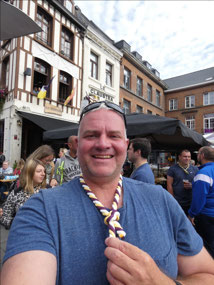
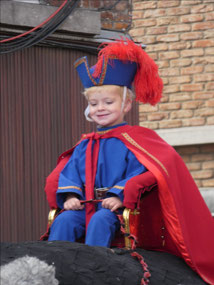
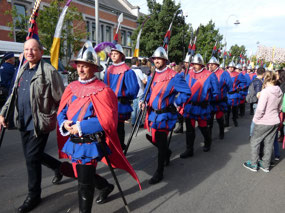
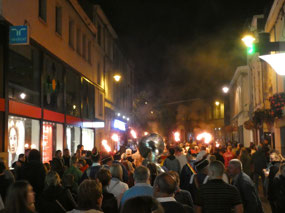
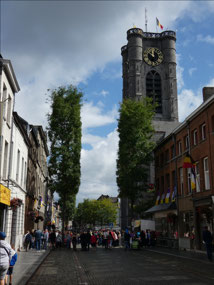
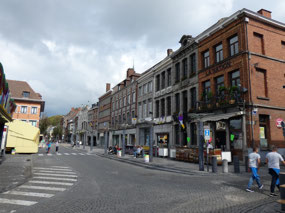






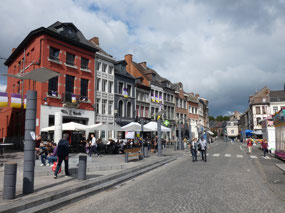
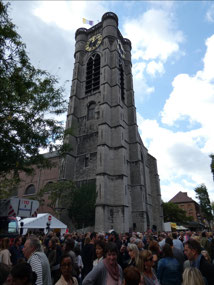
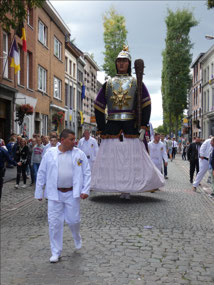
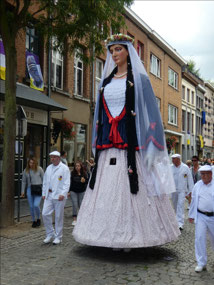
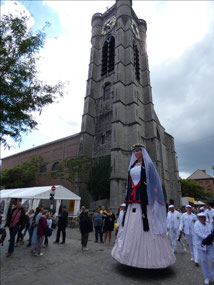
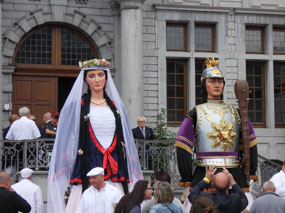
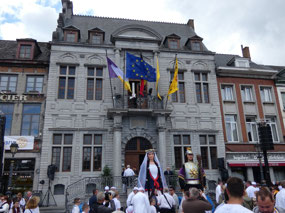
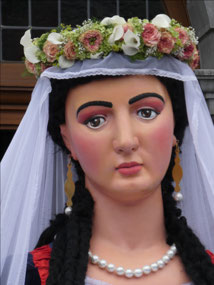
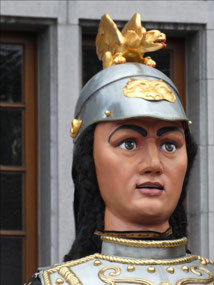
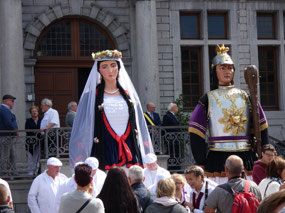
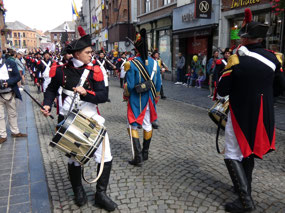
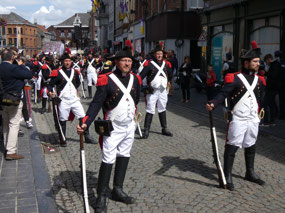
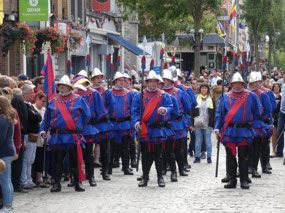
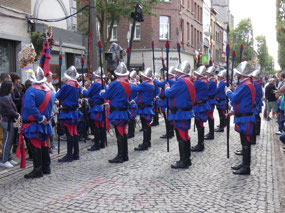
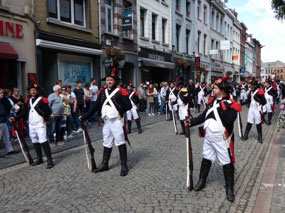
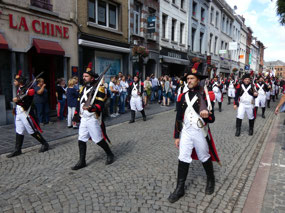
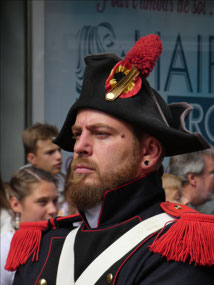
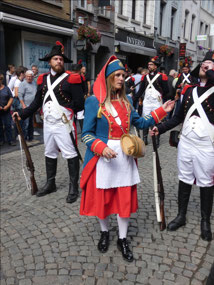
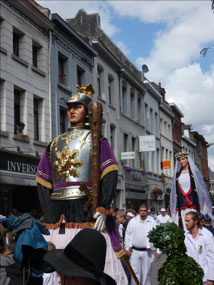
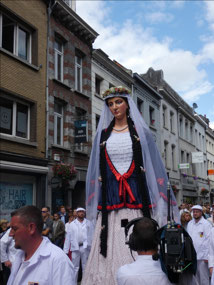
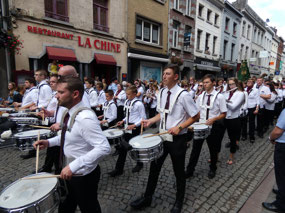
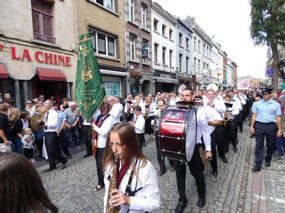
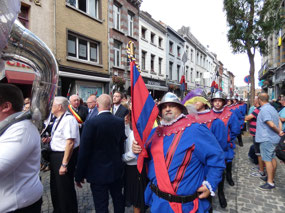
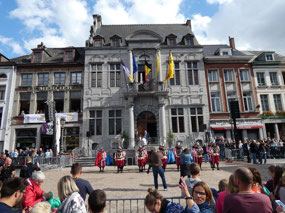
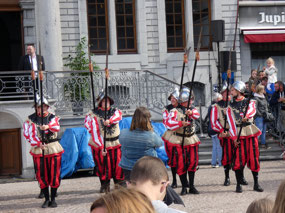
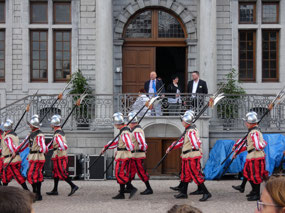
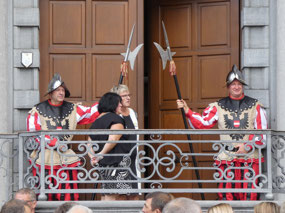
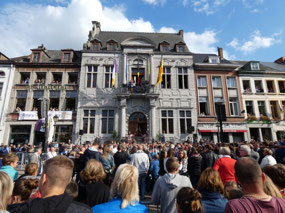
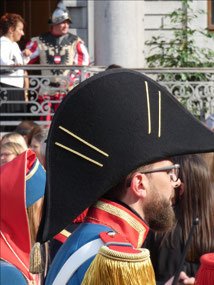
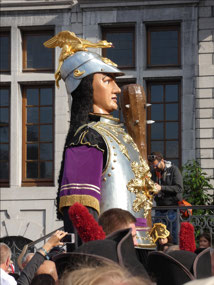
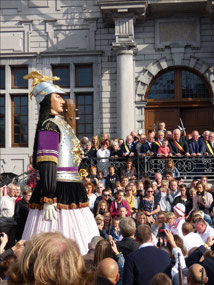
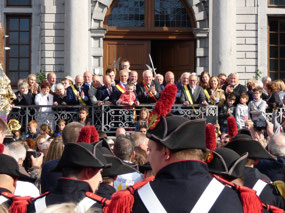
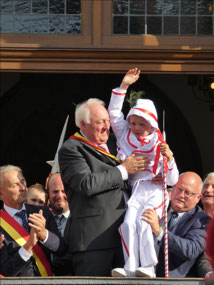
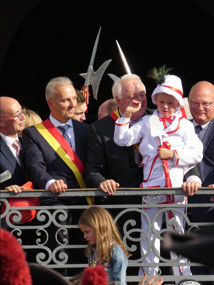
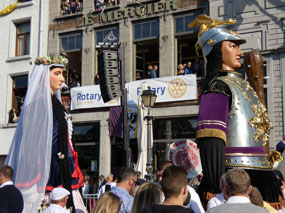
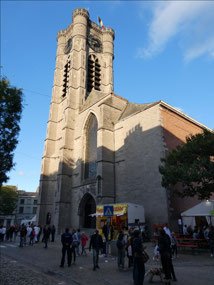
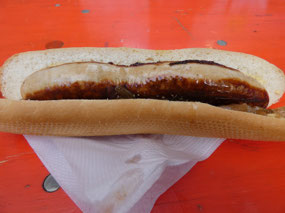
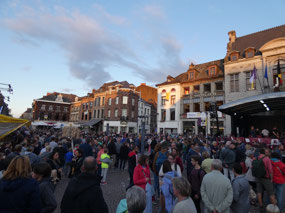
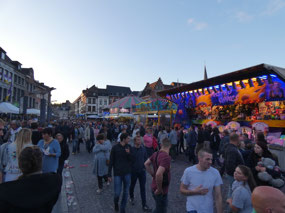
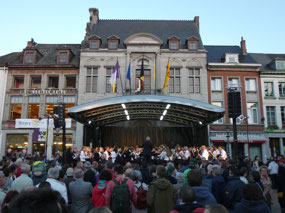
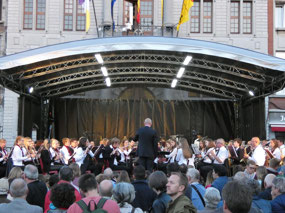
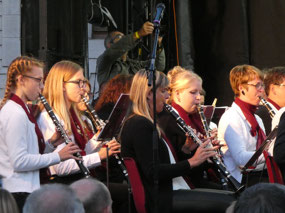
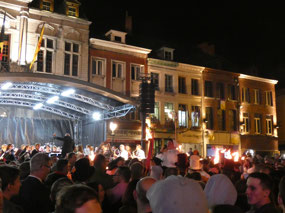
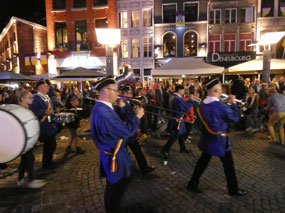
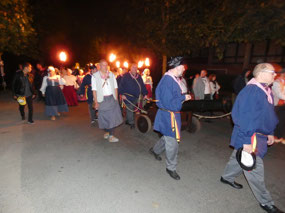
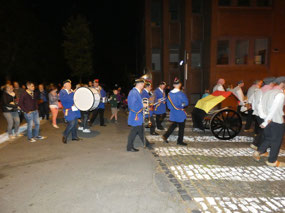
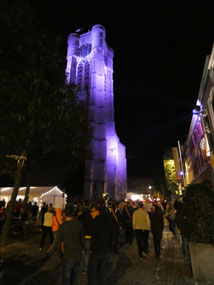
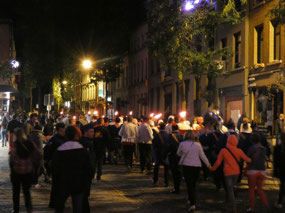
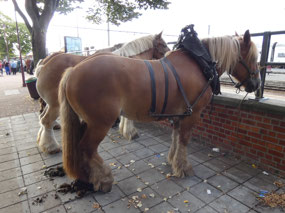
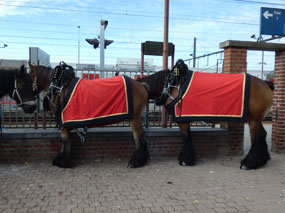
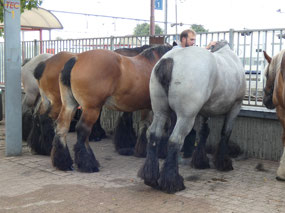
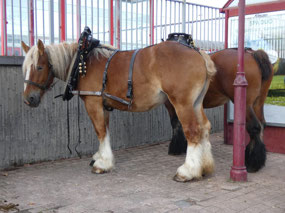
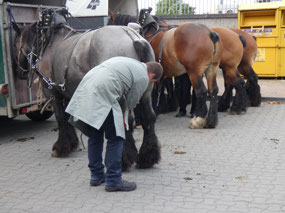
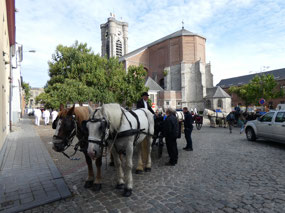
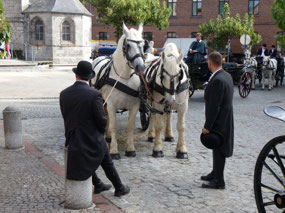
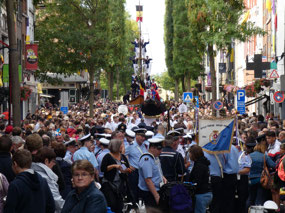
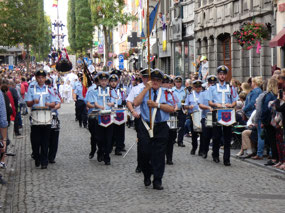
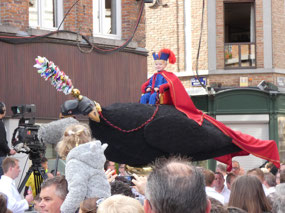
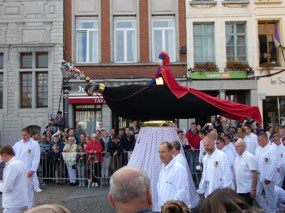
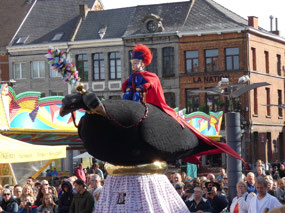
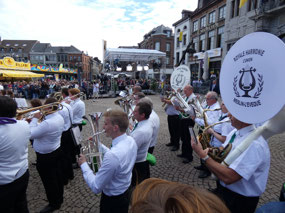
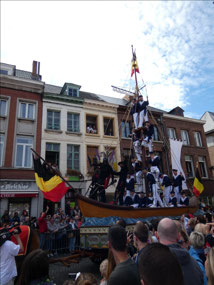
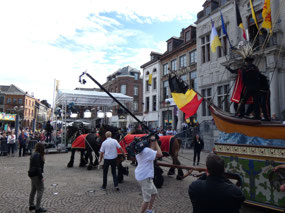
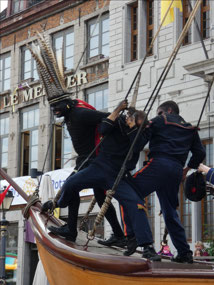
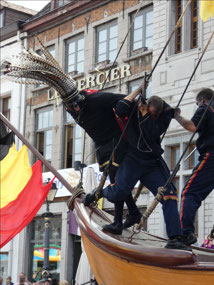
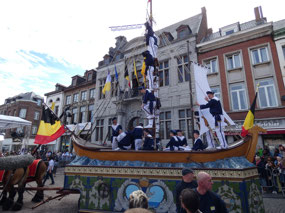
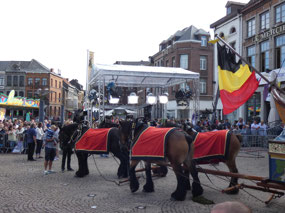
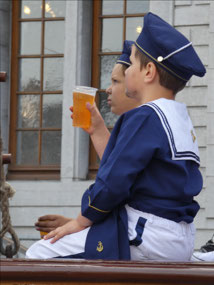
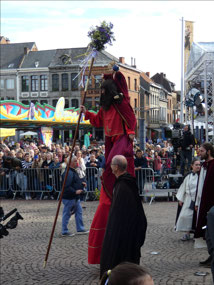
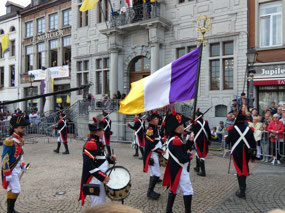
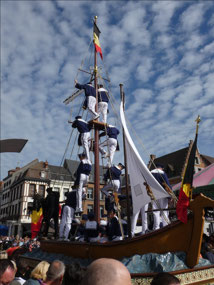
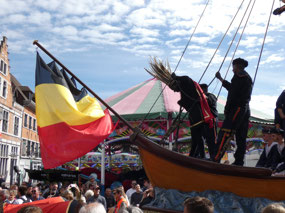
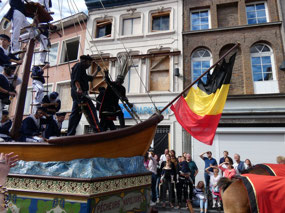
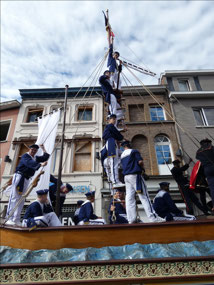
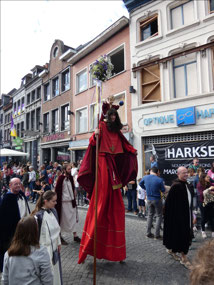
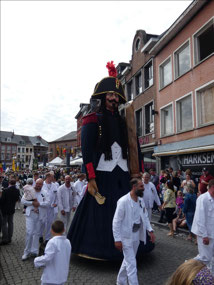
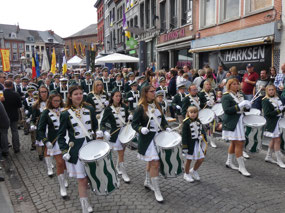
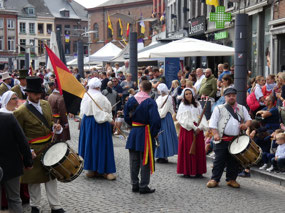
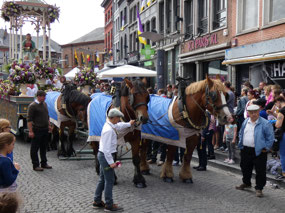
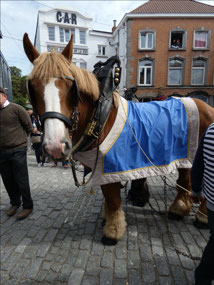
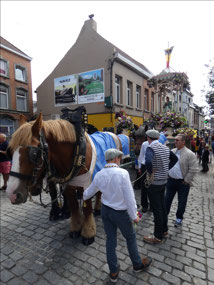
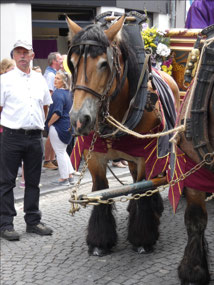
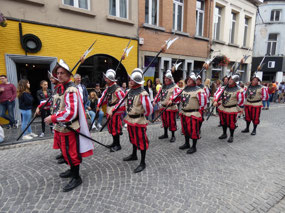
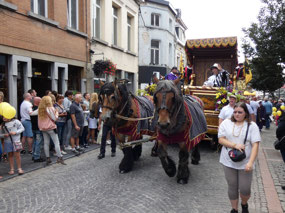
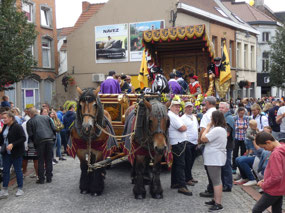
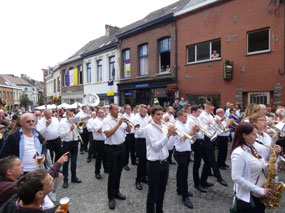
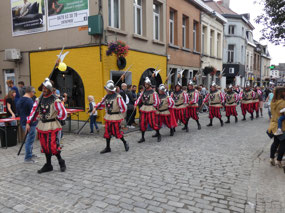
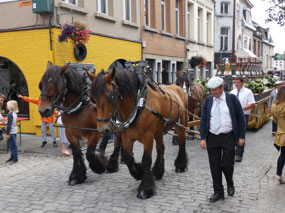
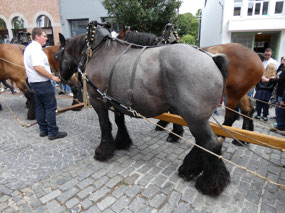
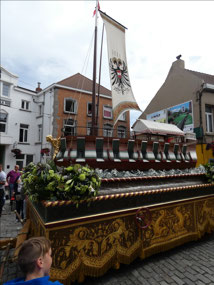
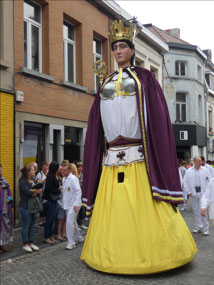
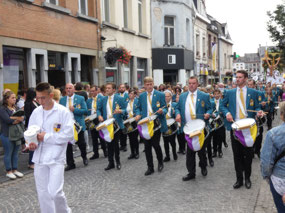
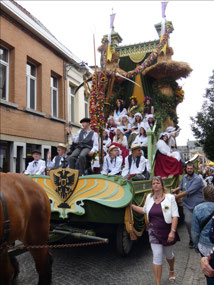
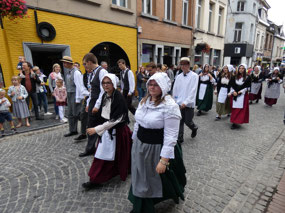
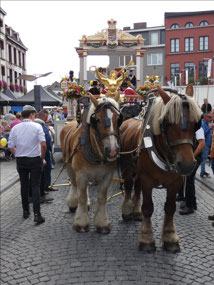
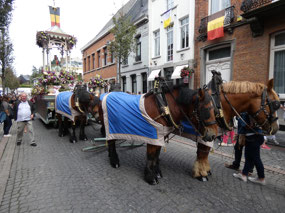
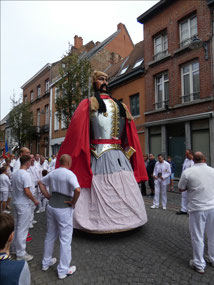
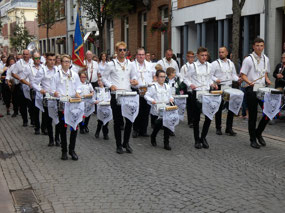
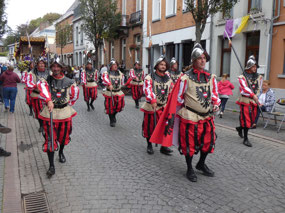
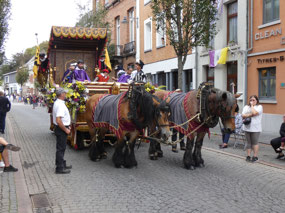
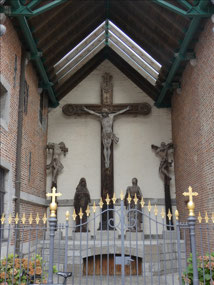
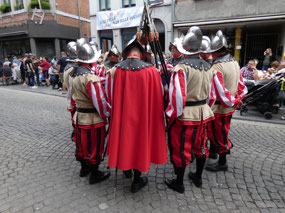
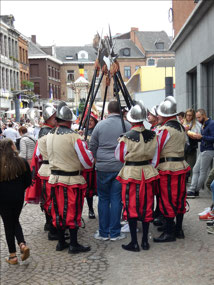
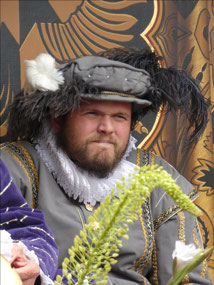
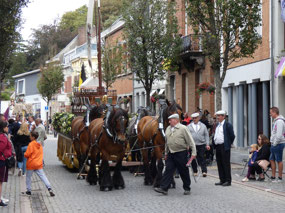
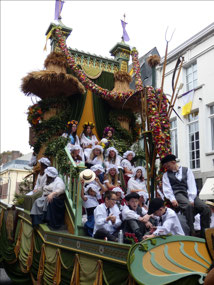
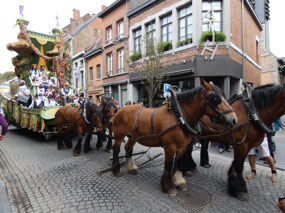
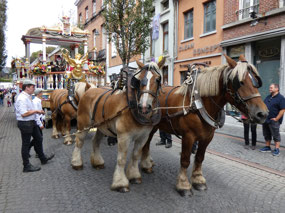
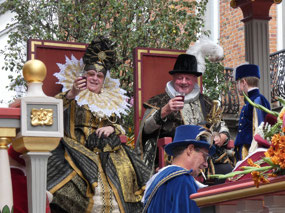
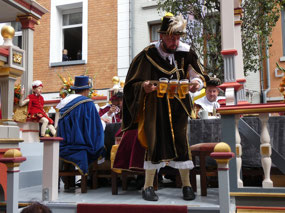
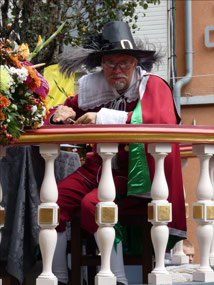
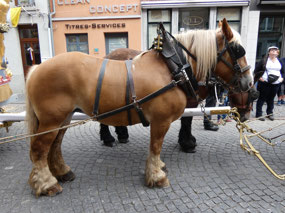
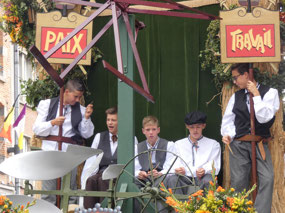
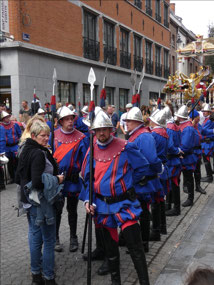
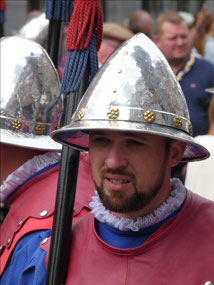
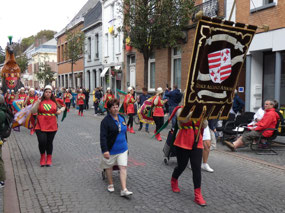
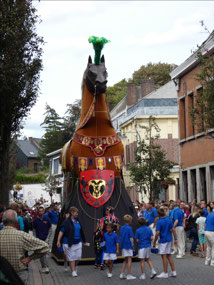
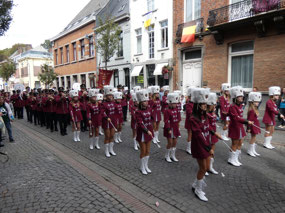
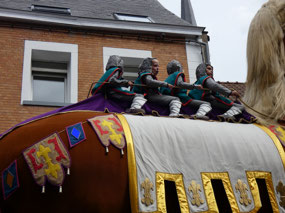
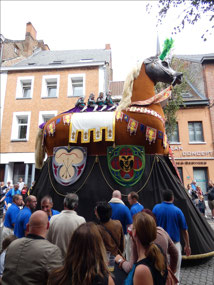
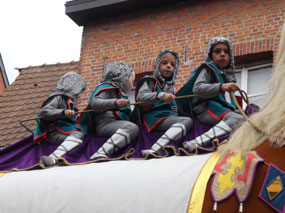
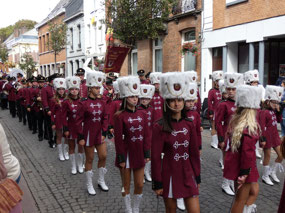
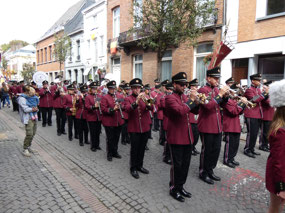
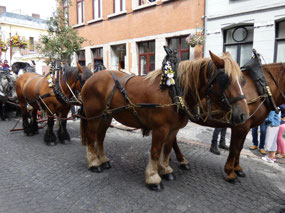
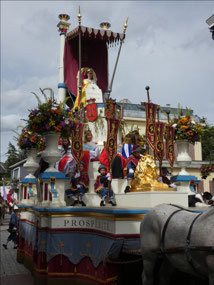
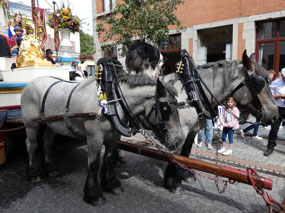
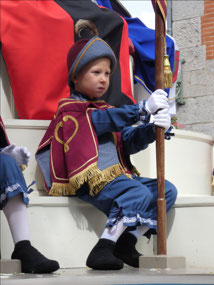
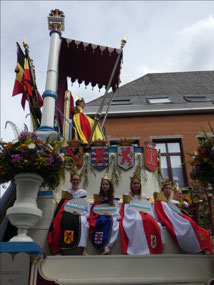
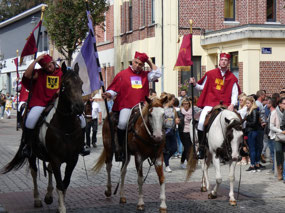
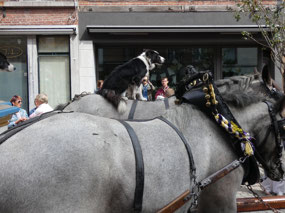
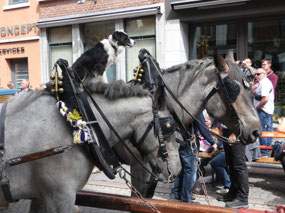
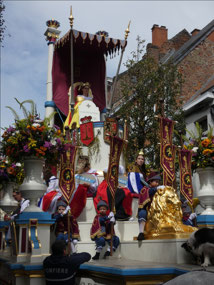
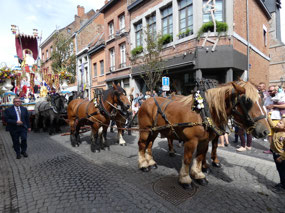
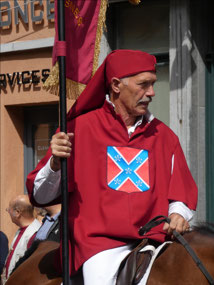
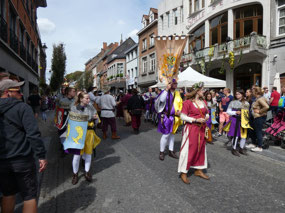
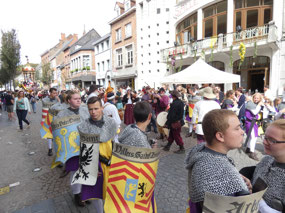
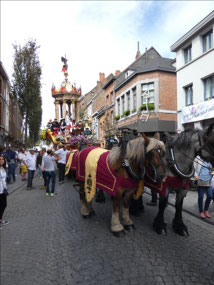
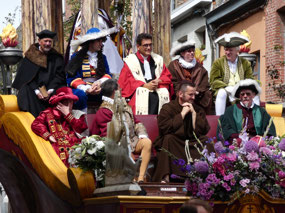
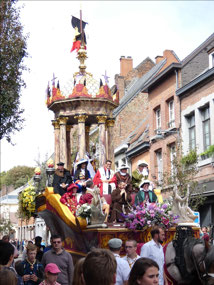
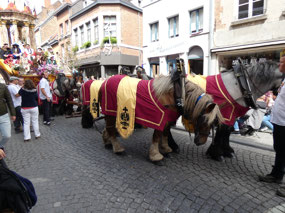
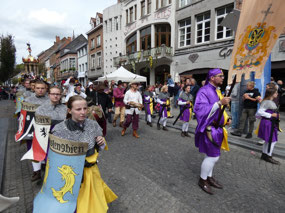
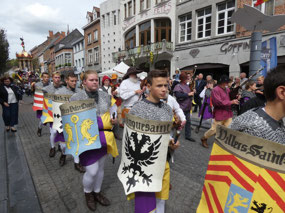
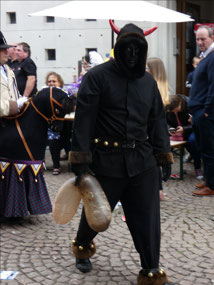
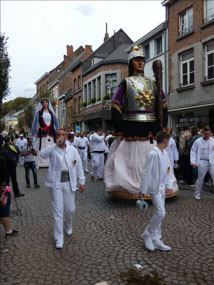
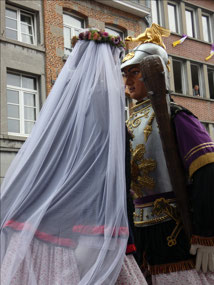
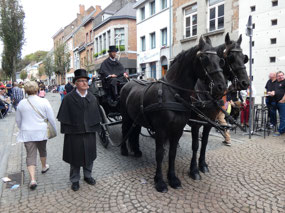
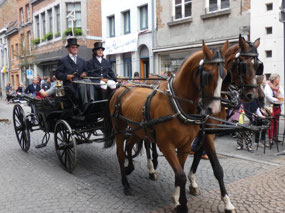
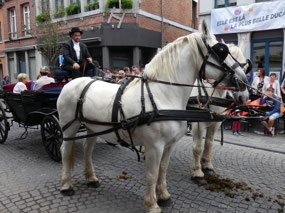
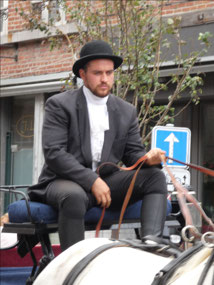
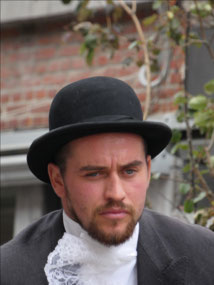
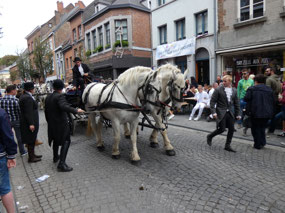
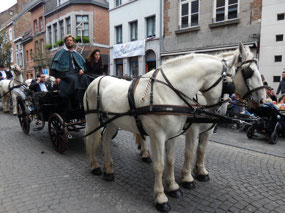
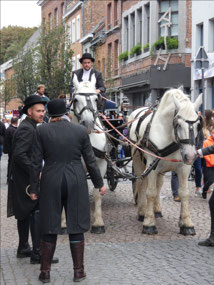
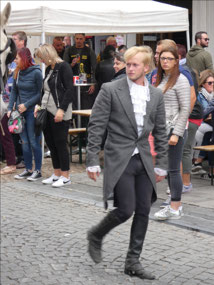
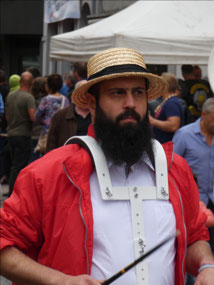
2025-05-22